-- The global caseload reached 200,053,793 with a total of 4,254,824 deaths worldwide as of 0030 GMT on Thursday, according to the Center for Systems Science and Engineering at Johns Hopkins University.
-- Currently, many parts of the world are mired in severe resurgences of infections mainly fuelled by the more contagious variants of COVID-19, including the Delta variant, which the World Health Organization (WHO) said has spread to more than 130 countries.
-- At this critical moment when one in every 39 people on the planet has been infected by the lethal pathogen, calls for global solidarity, vaccine equity and science-based approaches require a rapid response.
by Xinhua writer Dong Yue
BEIJING, Aug. 5 (Xinhua) -- Global COVID-19 cases exceeded 200 million on Thursday, with the death toll surpassing 4.25 million, marking another heartrending milestone in the global pandemic fight that has lasted for more than a year and a half.
During the prolonged war, the coronavirus had shown signs of retreat several times, but managed to stage a comeback each time, with daily cases and deaths rebounding.

People visit an exhibition themed on COVID-19 pandemic in Rio de Janeiro, Brazil, March 11, 2021.
(Photo by Luciana Whitaker/Xinhua)
A key reason for the resurgences is the virus' cunning ability to evolve. However, some countries' irresponsible approaches to handling the pandemic at home and abroad, the astoundingly-unbalanced vaccine rollout worldwide and people's lowered vigilance amid aspirations for a normal life have played crucial roles in splitting humans' line of defense.
At this critical moment when one in every 39 people on the planet has been infected by the lethal pathogen, calls for global solidarity, vaccine equity and science-based approaches require a rapid response.
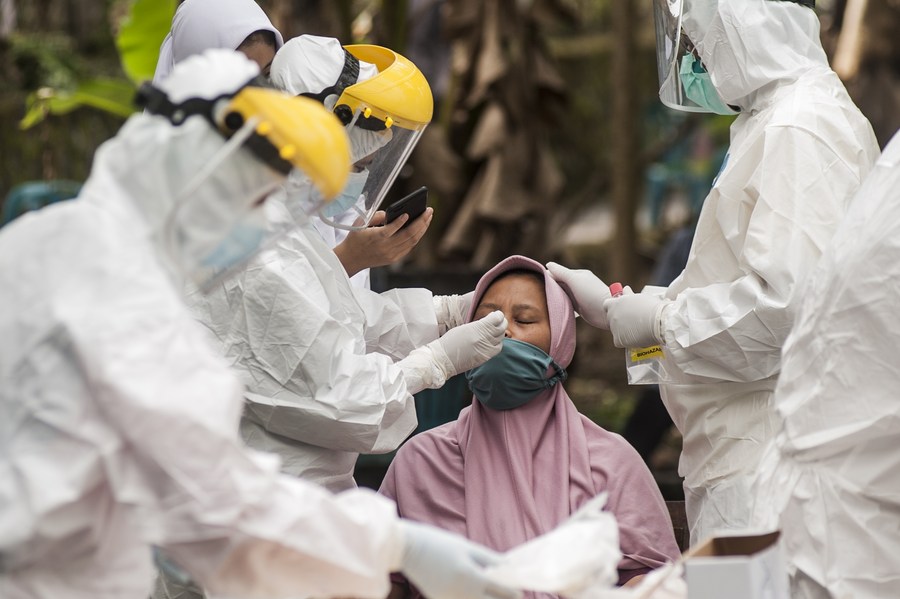
A health worker takes a swab sample from a woman for COVID-19 test in Yogyakarta, Indonesia, June 14, 2021.
(Photo by Supriyanto/Xinhua)
GRIM FIGURES
The global caseload reached 200,053,793 with a total of 4,254,824 deaths worldwide as of 0030 GMT on Thursday, according to the Center for Systems Science and Engineering (CSSE) at Johns Hopkins University.
With 35,323,182 cases and 614,793 deaths, the United States has suffered the most from the pandemic, accounting for nearly 18 percent of the global caseload. Though the country's new daily cases in June temporarily dropped to its lowest level in more than a year, its daily new infections jumped to more than 102,000 on Wednesday.
In India, a total of 31,769,132 cases have been recorded, second only to the United States. India's death toll stands at 425,757. Brazil has registered 20,026,533 cases with the world's second largest number of deaths of 559,607.
Countries with more than 5 million cases also include Russia, France, Britain and Turkey, according to the CSSE.
Currently, many parts of the world are mired in severe resurgences of infections mainly fuelled by the more contagious variants of COVID-19, including the Delta variant, which the World Health Organization (WHO) said has spread to more than 130 countries.
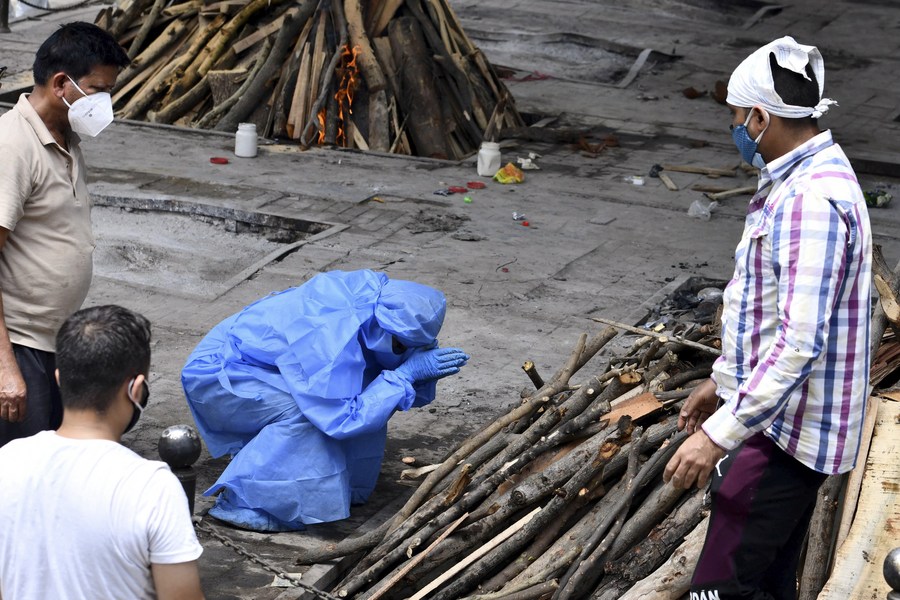
A family member wearing a protective suit prays in front of the pyre to his relative before cremation at a crematorium in New Delhi, India, May 21, 2021.
(Xinhua/Partha Sarkar)
Canada is at the start of the Delta-driven fourth wave of COVID-19, Canada's Chief Public Health Officer Theresa Tam said on Friday.
"The updated longer-range forecast shows how the epidemic trajectory may evolve through early September. It suggests that we are at the start of the Delta-driven fourth wave, but that the trajectory will depend on ongoing increases in fully vaccinated coverage, and the timing, pace and extent of reopening," Tam said at a press conference in Ottawa.
Across Europe, the Delta variant has become the most dominant strain, and it will be the globally dominant strain over the coming months, the WHO Regional Office in Europe and the European Center for Disease Prevention and Control said in a joint statement on July 23.
"We are seeing a significant rise in cases associated with the spread of the highly transmissible Delta variant," Hans Kluge, regional director of WHO Europe, said in the statement.
Simultaneously, in some Asian and African countries, a fourth wave of infections aggravated by the Delta variant is around the corner or has already arrived, while Latin America is also trying to slow down the spread of the variant.
"This pandemic is nowhere near finished. Hard-won gains are in jeopardy or being lost, and health systems in many countries are being overwhelmed," WHO spokesperson Tarik Jasarevic said.
"The Delta variant is causing devastation and more variants -- with the potential to be even more dangerous -- will emerge if we do not control the virus," Jasarevic warned.
IRRESPONSIBLE APPROACHES
The United States' irresponsible ways of handling the pandemic both at home and abroad have turned the world's most developed country into a major source of infections and one of the weakest links in the global fight against the deadly pathogen.
Some U.S. politicians' ignorance of science has given free rein to an anti-science sentiment across the country, which is epitomized by a lasting debate on mask-wearing and a sweeping doubt about vaccines.
Though the United States is hoarding enough COVID-19 vaccines for the U.S. public, it has one of the highest rates of vaccine hesitance or refusal, The New York Times recently reported.
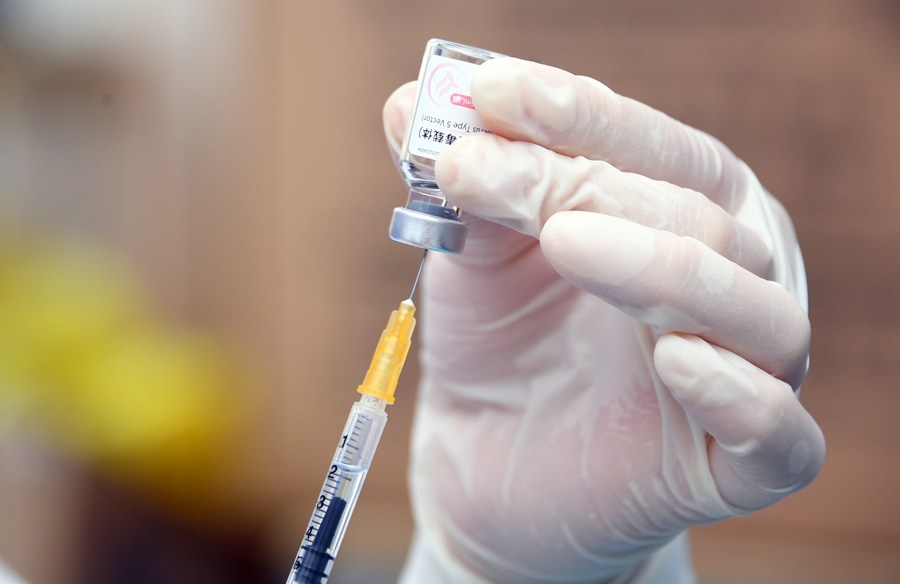
A medical worker prepares to administer a dose of COVID-19 vaccine at a temporary vaccination site in Haidian District of Beijing, capital of China, May 20, 2021.
(Xinhua/Ren Chao)
The reasons why Americans refuse to get inoculated include "a belief that the virus is not that bad, the hope that rural lifestyles make catching COVID-19 less likely and general distrust of government experts," according to a recent report by CNN.
To conceal the government's incompetence and shift the blame, the United States has been scapegoating others from the early stage of the pandemic, and has recently been sparing no effort to politicize the origin-tracing work, which have gravely undermined global cooperation against the virus and encountered strong opposition from the international community.
As some Americans are hesitant about or squarely against getting COVID-19 vaccines, the vaccines are not yet available in many African countries that are well-prepared for their roll-out. WHO data showed that less than 2 percent of all doses administered globally have been in Africa, while just 1.5 percent of the continent's population are fully vaccinated, in stark contrast to the surplus in the United States.
"While hundreds of millions of people are still waiting for their first dose, some rich countries are moving towards booster doses," WHO Director-General Tedros Adhanom Ghebreyesus told a media briefing on Wednesday.
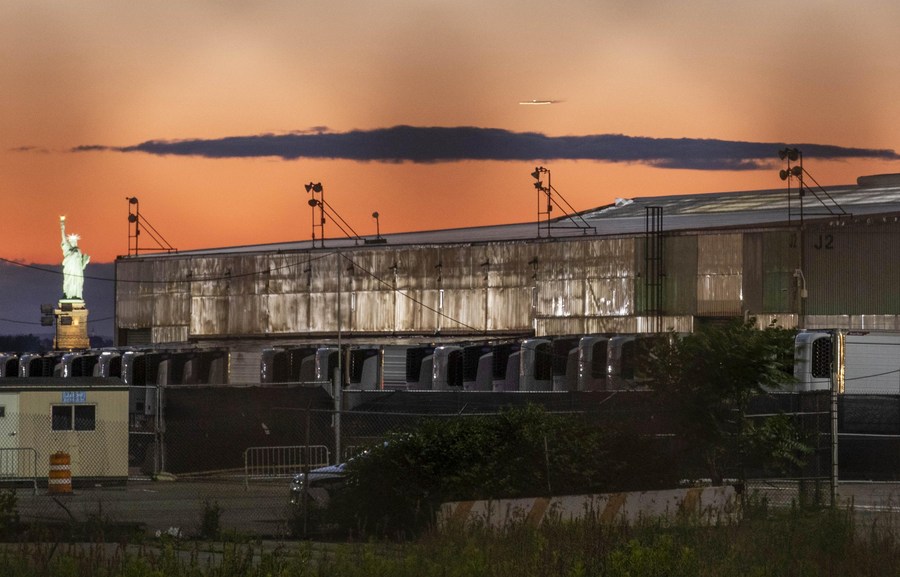
Refrigerated trailers are seen at a temporary morgue in Brooklyn, New York, the United States, June 15, 2021.
(Xinhua/Wang Ying)
So far, more than 4 billion vaccine doses have been administered globally. More than 80 percent of them have gone to high- and upper-middle income countries, even though they account for less than half of the world population, Tedros said.
In the latest update to its World Economic Outlook released last month, the International Monetary Fund downgraded the growth prospects for emerging market and developing economies amid new outbreaks and shortages of vaccines.
URGENT CALLS
In the face of the sobering alarm sounded by the 200-million mark, experts and officials have warned against a disastrous future for humankind and urged closer global cooperation in seeking a turning point in the world's pandemic fight.
The 200-million mark "means that the world is plunging into the darkest hour of human history and there is a need to support each other," said Muhammad Asif Noor, director of the Institute of Peace and Diplomatic Studies in Islamabad, calling on all countries to "act together and act fast beyond our egos."
Noting "no country can stay safe until all countries are safe," said Natee Taweesrifuengfung, president of the Thailand-based Siam Think Tank. "All countries should enhance political mutual trust, resort to constructive dialogue and communication, push for concerted efforts against the pandemic and fight against it in a scientific manner."
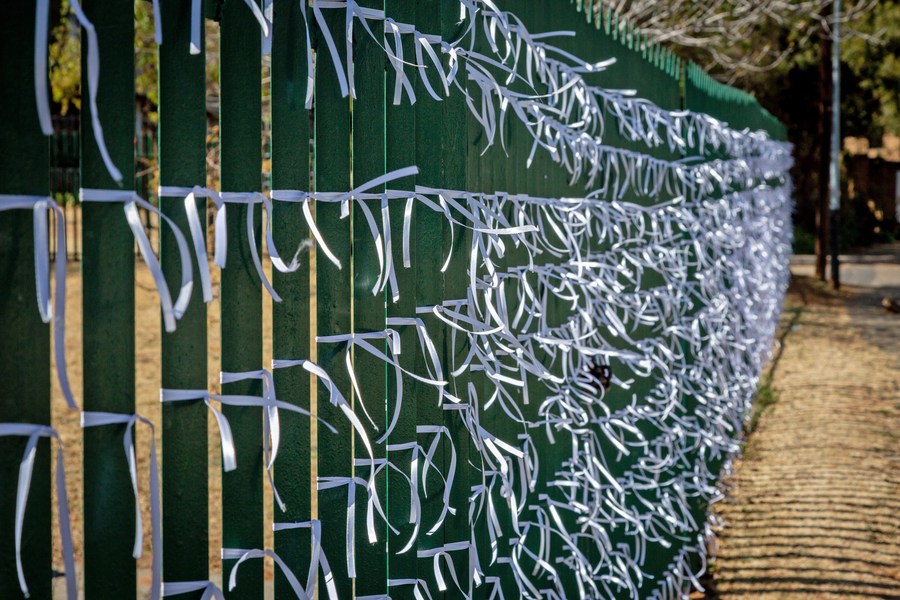
Photo taken on July 25, 2020 shows ribbons for blessings outside a church in Johannesburg, South Africa.
(Photo by Yeshiel/Xinhua)
Meanwhile, Stephen Winchester, consultant virologist at Britain's Berkshire and Surrey Pathology Services, stressed the particular need for closer global cooperation in vaccine development and distribution.
"Working together, having that shared understanding, you know, that it's a global disease," Winchester said. "We will need to work together not just on the vaccine development, but on their deployment as well and getting access for everyone across the globe."
Warning against the politicization of the pandemic, especially the origin-tracing work, experts across the world have refuted baseless accusations and advocated a cooperative and scientific manner in dealing with the virus.
"Accusations and conspiracy theories will solve nothing. Instead, constructive collaborative interactions on an international basis will be needed," said Jonathan Stoye, an expert at the Francis Crick Institute in London.
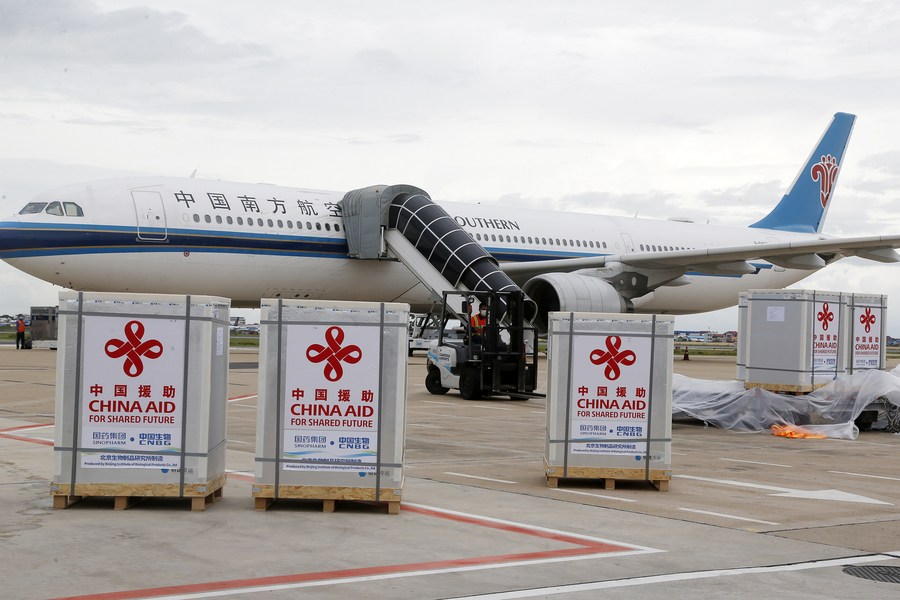
Photo taken on June 8, 2021 shows packages of Chinese COVID-19 vaccines arriving at the Phnom Penh International Airport in Phnom Penh, Cambodia.
(Photo by Phearum/Xinhua)
The U.S. accusation of China on the origin of the COVID-19 pandemic is "totally inappropriate," Buthaina Shabaan, Syria's presidential political advisor, said, adding the United States is unable to mislead anyone by such accusations because "the world knows what the origin of these accusations is."
The Syrian official thanked China for providing vaccines and medical equipment to the Syrian people, stressing China sets an example in keeping the pandemic under control.
Shabaan's remarks were echoed by Taweesrifuengfung, who appreciated China's role in boosting global efforts against the pandemic.
"It shared the whole genome sequence of the virus with the world ..., providing a solid basis for global scientists to develop medicines and diagnostics. It also shared its experience and provided as much support as it can to countries in need, including offering vaccines and dispatching medical teams," said Taweesrifuengfung.
"China has made a great contribution to the global battle against COVID-19," said the expert.
On strengthening global cooperation, "we have an example of China, how the pandemic was controlled and how the country has not only fought well the virus but also extended support ... to the countries in need," said Noor, the expert in Islamabad. (Video reporters: Li Jie, Feng Yiwei, Yang Yi, Tang Yang, Liu Meizi, Shui Jinchen, Wang Ping, Shi Xiantao, Liu Chang; video editor: Yang Zhixiang)■




